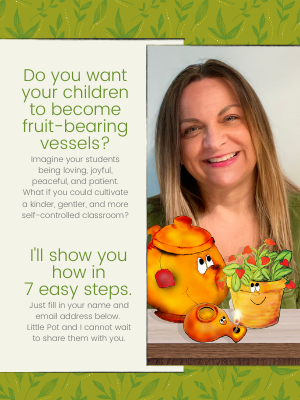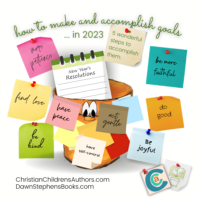2023 Goals – How to Make and Accomplish SMART and Biblical Goals
What are your 2023 goals? I bet you have specific things you would like to accomplish this year. Maybe you’ve made a list. Or perhaps, you hesitate to write them down for fear you do not achieve them. Educators are very familiar with goal setting. They are often asked to write SMART goals for themselves and their students. SMART is an acronym for Specific, Measurable, Attainable, Relevant, and Time-bound. This is a critical practice. However, shouldn’t the goals we create for ourselves and our children also be Biblical? Here are five steps to ensure they are SMART and biblical!
As a school principal, I often found the need to help students and teachers set goals. Therefore, I developed a goal-setting worksheet with five steps. Our school focused on the fruit of the Spirit. We wanted to make sure that our behaviors exemplified Christ. Likewise, our goals needed to reflect love, joy, peace, and patience. Showing kindness, goodness, and faithfulness were also a focus. In addition, gentleness and self-control are essential in the classroom.
Following each step would ensure that each goal was specific, measurable, attainable, relevant, and time-bound. The worksheet also reinforces the developments we can experience when God grows the fruit of the Spirit through us. Here are the steps explained:
2023 Goals – Step 1
In the center of the flower, write a goal specifically to be more loving, peaceful, patient, kind, etc. (See Galatians 5:22-23). Include a deadline for your goal. Setting it for a full year can make it difficult. Therefore, I recommend a shorter time frame of days or weeks. We can confidently know that God can grow His fruit. Therefore, whatever characteristic of the fruit of the Spirit we choose, the sentence should read,
” I know God will grow __(love, joy, patience, self-control, etc.)__ in me by _(date)__.”
While God grows the fruit, we are responsible for doing the required work. Therefore, we must write specific actions we can take inside the pedals. The following are some examples students wrote.
- “I know God will grow patience in me by (end-date).”
- Raise my hand before I speak.
- Let my friends be first in line.
- I am patiently waiting my turn at the water fountain.
- “I know God will grow kindness in me by (end-date).”
- Share the math tubs with friends.
- Say nice things to my classmates.
- Keep my hands to myself and not hit.
- “I know God will grow self-control in me by (end-date).”
- Complete my morning work every day.
- Not get upset if others do not play fair at recess.
- Not play in the restroom.
2023 Goals – Step 2
In the fruit-bearing process, the leaves represent relationships that nourish us and bring the light of Christ into our lives (Photosynthesis). Therefore, on each leaf, you will need to write the name of a friend or family member who can help you achieve your goal. Here are some examples:
- “Samuel can help by not sitting next to me on the carpet because I like to talk to him.”
- “My mom can help me by waking me up earlier, so I will not be late each day.”
- Mrs. Jones can help by giving me the single to raise my hand if I begin to talk out of turn.”
- “Cindy can help me by reminding me to get all my supplies before we begin to work.
Step 3
The stem of the plant represents integrity. Likewise, accomplishing goals will take integrity. Honesty is a big part of achieving goals. Some of the action steps may take a lot of work to monitor. Therefore, the participant must be trustworthy. Remind them that the stem connects the different pieces of the fruit plant. In the same way, their integrity will connect all the parts of their goal.
Step 4
Considering the parable of the sower, the dirt where fruit grows the best is called humus or good soil. In addition, humus is the root word for humility. The seed represents God’s Word (Luke 8:11). Therefore, in this step, the goal-setter should humbly agree to obey a verse that supports the goal. Below are some verses you can use for each characteristic of the fruit.
- Love: John 15:9; 1 Corinthians13; 1 John 4:19
- Joy: Psalm 71:23; John 16:22-24
- Peace: Romans 12:18, 14:9; 1 Corinthians 14:33; Philippians 4:6-7
- Patience Proverbs 14:21; 15:18; 28:11; 1 Thes. 5:14; James 5:8-9
- Kindness: Proverbs 11:16,17; Jeremiah 9:23-24; Luke 6:31; Job 6:14
- Goodness: Psalm 23:6; Ephesians 5:8-10; Galatians 6:9,10
- Faithfulness: Proverbs 3:3, Matthew 23:23; Revelation 2:10b
- Gentleness: Proverbs 15:1; Colossians 3:12, Philippians 4:5,1 Peter 3:15
- Self-control: Proverbs 25:28, Proverbs 29:11, Titus 2:11-12, 1 Peter 4:7
Step 5 – Celebrate your 2023 Goals!
When the end date arrives, and you’ve met your 2023 goals, praise God that He grew fruit through you. Celebrating is an excellent way to practice praising God for the good things that happen in life. Place a strawberry sticker on the chart and dance. Achieving a goal is no tiny feet. Consequently, the more we celebrate, the more eager we will be to set the next goal!
In conclusion, it’s essential to set goals that help us to grow spiritually, socially, and academically. I’d love for you to join Little Pot and me on a fruit-bearing journey, type in your first name and email below. We will send you the steps to be the fruit-bearing vessel God designed you to be. In addition, you’ll receive fruitful Friday emails that can keep you focused on your 2023 fruitful goals all year long.

Be sure to subscribe to receive updates from the Children’s Christian Authors Blog. Follow us for book reviews, free resources, parenting tips, and encouragement. #christianchildrensauthors #christianbooks #christianauthors #christianwritiers #christianteachers #christianchildrensbooks #goalsetting #newyearresolution #2023goals #dawnstephens #dawnstephensbooks


Such great suggestions! I’m actually going to use them for making my own Biblical goals for 2023.
Yay Claire! I’ll say a prayer for you as you so. Thanks for your comment.